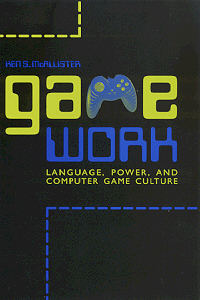introduction
|
| grammar | |||
|
McAllister articulates his grammar of gamework in the second chapter of his book, where he advances a Marxist understanding of the relationship between dialectic, rhetoric, and ideology. After explaining that "dialectics is a way to search for truths, while rhetoric is a way to convey truths" (29), he states that "[t]he interplay between dialectical inquiry and rhetoric [. . .] is what enables the constructions of histories, scientific facts, political exigencies, and a host of other discursive formations" (29). Understood in this sense, a study of the computer game complex is necessarily a study of a multifaceted, dialectical system in which change and the resistance to change is inevitable. To understand the role that rhetoric and ideology play in this system, it is important to understand that the various agents implicated in the computer game complex employ rhetoric to gain dominance or authority over certain aspects of the dialectic or system. Their efforts result in struggles, or moments of observable contradictions, some of which may be solved by rhetoric, some of which cannot (29). McAllister is interested in those rhetorical events that result in a "metanoetic experience," or a change of mind (30). These transformative experiences are a result of an individual's ability to reconcile her own ideologies with signifying rhetorical events and to do so within the context of the dialectical system under which the rhetorical events take place (30-1). If this sounds complicated—and we argue that it is—McAllister distills his theory down to five propositions that are specific to the computer game complex:
To address these propositions, McAllister introduces a "Grammar of Gamework" (44) that is designed to "[provide] a description of how meaning may be made and managed specifically by those who design, market, and play computer games, and [. . .] simultaneously [offer] a way for computer game scholars to talk about the processes and techniques involved in this meaning-making process" (43). Reminiscent of Kenneth Burke's Pentad, McAllister's grammar is composed of five interrelated elements that, when combined in various ratios, "give substance to the underlying and sometimes ephemeral dialectical struggles they describe" (44). McAllister's grammar of gamework is composed of the following five elements: As McAllister claims, these elements are comprehensive and flexible enough to "[enable] rich and insightful understandings of the nature of particular dialectical struggles located both inside and outside the computer game complex" (64). They provide game scholars with an inherently heuristic approach that allows them analyze and map the complex dialectical and rhetorical relationships that underlie the computer game complex and to identify how these relationships shape the computer games themselves. |
